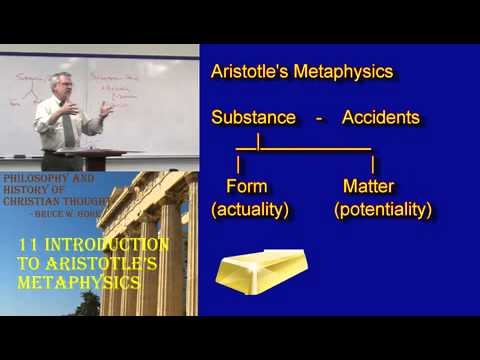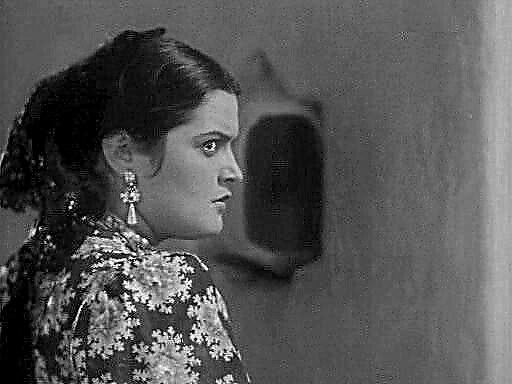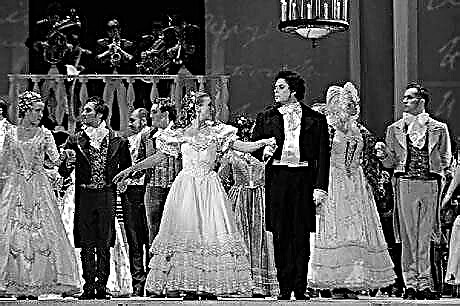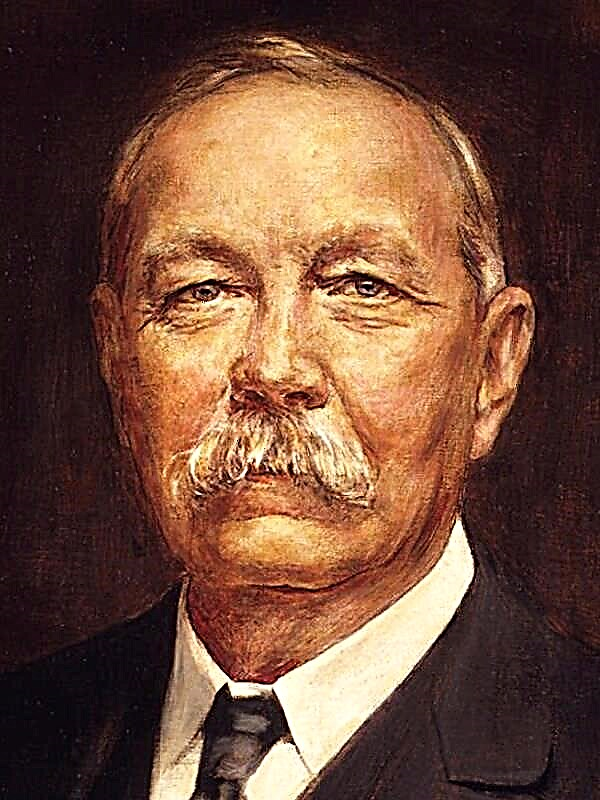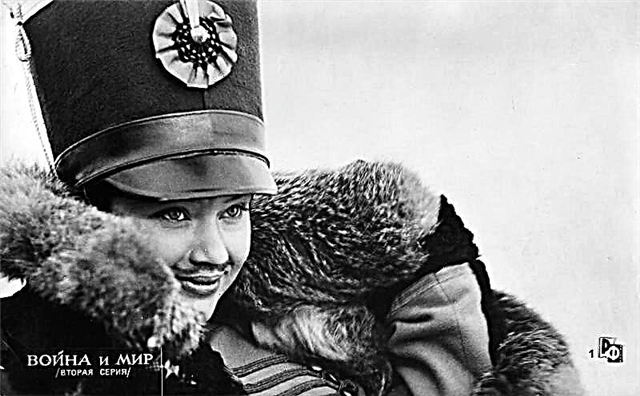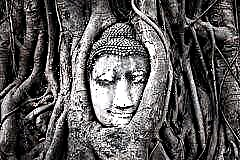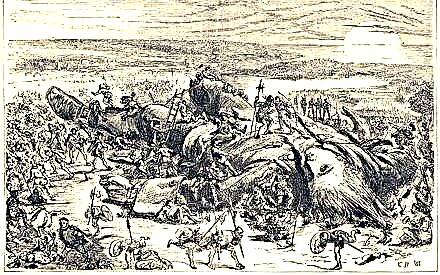In the introduction, the Beggar author says that if poverty is a patent for poetry, then no one will doubt that he is a poet. He is a member of a troupe of beggars and participates in performances that this troupe gives weekly in one of the poorest quarters of London - St. Giles. The actor recalls that the muses, unlike all other women, do not meet anyone in the dress and do not consider the catchy outfit a sign of the mind, and modest clothes - a sign of stupidity.
The beggar says that his play was originally intended to be performed at the wedding of two excellent singers - James Chanter and Mall Lay. He introduced into it comparisons found in the most famous operas - with a swallow, a moth, a bee, a ship, a flower and so on. He wrote an exciting scene in prison, abandoned the prologue and epilogue, so his play is an opera in all respects, and he is glad that after several performances in the great hall in St. Giles she will finally be shown on the real stage.
All arias in it are performed on the melodies of popular street songs or ballads. Pichem - a stolen buyer - sings an aria that people vainly condemn other people's activities: despite all the differences, they have a lot in common. Pichem argues that his craft is similar to that of a lawyer: both live thanks to fraudsters and often work in double quality - they either encourage criminals or surrender them to justice. Pitchema Filch, the assistant, reports that the trial of the Black Mall is due at noon. She will try to settle everything, but in an extreme case, she may ask that the sentence be postponed due to pregnancy - being an adventurous person, she secured this exit in advance. But Tom Gag, who faces the gallows, is not going to save Pich - Tom is awkward and comes across too often, it’s more profitable to get forty pounds for his extradition. As for Betty Hitryuga, Picham will save her from exile in the colony - in England he will earn more on it. “You won’t win anything on the death of women - except that it’s your wife,” remarks Picham. Filch performs an aria about the corruption of women.
Filch goes to Newget Prison to please his friends with good news, and Picham considers who should be sent to the gallows during the next trial. Mrs. Picham believes that there is something attractive in the guise of death row prisoners:
Let Venus Belt Your
Put on a freak
And immediately from men any
He will see the beauty in her.
The loop is just like a belt
And a thief who is proud
In a cart rushing to the scaffold
For women, more beautiful than the Lord.
Mrs. Picham asks her husband about Captain Machith: the captain is so cheerful and amiable, there is no gentleman on the highway who is equal to him! According to Picham, Macheath spins in too good a society: gambling houses and coffee houses ruin him, so he will never get rich. Mrs. Picham laments: “Well, why should he lead a company with all kinds of lords and gentlemen there?” Let yourself rob each other. ” Upon learning from his wife that Macheath cares for their daughter Polly and Polly is not indifferent to him, Picham begins to worry that her daughter would not jump out to get married, because then they will become dependent on their son-in-law. You can let the girl do everything: flirt, an affair, but not marriage. Mrs. Picham advises her husband to be more affectionate with her daughter and not offend her: she loves to imitate noble ladies and, perhaps, allows the captain of liberty only for reasons of profit. Mrs. Picham herself believes that a married woman should not love her husband alone:
The girl is similar to an ingot:
The number of guineas in it is unknown,
While their treasury from him
Does not mint out fully.
Wife w - Guinea that goes
With the stigma of the spouse in circulation:
Takes and gives again
Her any without salvation.
Pikem warns Polly that if she plays the fool and strives to marry, then she will not be bored. Polly assures him that he knows how to concede in the little things, to refuse the main thing.
Upon learning that Polly did get married, her parents become indignant. “Do you really think, wretch, that your mother and I would live so long in peace and harmony if we were married?” - outraged Pich. In response to Polly's statement that she married McHeat not by calculation, but by love, Mrs. Picham scolds her for recklessness and bad manners. An affair would be excusable, but marriage is a shame, she said. He wants to capitalize on this marriage: if he sends Macheath to the gallows, Polly will inherit his money. But Mrs. Picham warns her husband that the captain may have several more wives who would challenge the widow of Polly. Pichom asks her daughter what means she is planning to live on. Polly replies that he intends, like all women, to live on the fruits of the labors of her husband. Mrs. Picham is amazed at her innocence: the bandit’s wife, like the soldier’s wife, sees money from him no more often than himself. Pichem advises his daughter to do as noble ladies do: copy property to themselves, and then become a widow. Parents demand that Polly report to Macheath - this is the only way to earn their forgiveness. “Do your duty and send your husband to the gallows!” Cries Mrs. Peach. Polly does not agree:
If a friend of a dove dies
Hit by a shooter
She is sad
Over the dove
And the earth falls like a stone
With him in death and in love together.
Polly tells MacHeat that her parents want him dead. Makhit must hide. When he is safe, he will let Polly know. Before separation, lovers, standing in different corners of the stage and not taking their eyes off each other, perform a duet, parodying the opera stamp of the time.
Thieves from a gang of Macheath are sitting in a tavern near Newget, smoking tobacco and drinking wine and brandy. Mat Kisten argues that the true robbers of mankind are hunks, and thieves only save people from excesses, because what's wrong with taking away from your neighbor what he does not know how to use? Macheath appears. He says that he quarreled with Picham, and asks his friends to tell Pichem that he threw the gang, and after a week he and Picham will reconcile and everything will fall into place. In the meantime, Macheath invites his long-time girlfriends and prostitutes to himself: he loves women very much and has never been distinguished by constancy and fidelity. But prostitutes betray Makhit Jenny Kozni and Sookie Snot hug him and give a sign to Pichem and the constables who rush in and grab him. In Newget, Lokit meets Makhet as an old acquaintance and offers him shackles to choose from: the lightest are ten guineas, the heaviest are cheaper, Makheit is lamented: there are so many requisitions in prison and they are so great that few can afford to get out safely or even die, as befits a gentleman. When Makhit is left alone in the cell, Lokit's daughter Lucy secretly comes to him, who reproaches him for infidelity: Makhit promised to marry her, and he is rumored to have married Polly. Macheath assures Lucy that he does not like Polly and in his thoughts did not have to marry her. Lucy goes to look for the priest, so that he will marry her with Macheath.
Lokit and Pichom make calculations. They decide to divide bribes for Makheit equally. Picha complains that the government is slow in paying and that puts them in a difficult position: after all, they need to carefully pay their informants. Each of them considers himself an honest man, and the other - dishonorable, which almost leads to a quarrel, but they catch on time: after sending each other to the gallows, they won nothing.
Lucy comes into the camera to MacHit. She did not find a priest, but she promises to make every effort to save her lover. Polly appears. She is surprised that Macheath is so cold with his wife. In order not to lose Lucy's help, Macheath renounces Polly, but Lucy does not believe him. Both women feel cheated and perform a duet on the motive of the Irish trot. Bursts into Pich, he pulls Polly away from Macheath and leads her away. MacHeath is trying to make excuses to Lucy. Lucy admits that it is easier for her to see him on the gallows than in the arms of an opponent. She helps MacHit run and wants to run with him, but he persuades her to stay and join him later. Upon learning of McHeath's escape, Lokit immediately realizes that the matter was not without Lucy. Lucy unlocks. Lokit does not believe his daughter and asks if Makheit paid her: if she entered into a better deal with Makheath than Lokit himself, he is ready to forgive her. Lucy complains that MacHeath acted like the last villain: he took advantage of her help, and he slipped away to Polly, now Polly will lure him out of money, and then Peachem will hang him and cheat on Lokite and Lucy. Lokit is indignant: Pichem intended to outwit him. Pitchem is his companion and friend, he acts according to the customs of the world and can refer to thousands of examples in justification of his attempt to deceive Lokit. So is it not worth Lokith take advantage of the rights of a friend and repay him with the same coin? Lokit asks Lucy to send some of Picham’s people to him. Lucy sends Filch to him. Filch complains about the hard work: due to the fact that the “pedigree stallion” has failed, Filch has to marry prostitutes so that they have the right to defer the sentence. If he does not find an easier way to earn a living, he is unlikely to reach the next court session. Upon learning from Filch that Macheath is in the warehouse of the stolen counterfeit bill, Lokit goes there. He and Pichyom check office books and make calculations. The list includes “twenty-seven women's pockets cut off with all contents”, “train from an expensive brocade dress”, etc. Their regular client - Mrs. Diana Happ comes to them. She complains about difficult times: the Act on closing the Mint, where insolvent debtors took refuge, dealt her a big blow, and with the Act on the cancellation of arrest for petty debts, life became even harder: now a lady can borrow a beautiful skirt or dress from her and not return and Mrs. Hupp has nowhere to look for council on her. Two hours ago, Mrs. Hupp tore off her dress with Mrs. Gossip and left it in one shirt. She hopes that Mrs. Gossip's lover - the generous captain Macheath - will pay her debt. Hearing of Captain Makhit, Lokit and Peach promise Mrs. Hupp to pay the debt for Mrs. Gossip, if she helps to see him: they have one thing to do with the captain.
Lucy sings an aria about an unfair fate, which sends her torment, while Polly she gives only pleasure. Lucy wants revenge and poison Polly. When Filch announces Polly’s arrival, Lucy greets her affectionately, apologizes for her rash behavior, and offers a drink as a sign of reconciliation. Polly refuses. She says she deserves pity, because the captain does not love her at all. Lucy comforts her: “Ah, Polly, Polly! “An unhappy wife is me, but he loves you as if you were only his mistress.” In the end, they conclude that they are in the same position, for both were too much in love. Polly, suspecting a trick, refuses to drink wine, despite all Lucy's persuasions. Lokit and Picham introduce Makhit in shackles. Pichom drives Polly and Lucy away: "Get out of here, you villains!" Now it’s not time for wives to annoy their husband. ” Lucy and Polly perform a duet about their feelings for Macheath. The captain is being taken to court. Lucy and Polly hear funny music: it is the prisoners whose affairs are postponed until the next session. Prisoners in shackles dance, and Polly and Lucy leave to indulge in grief. Makhit on death row drinks wine and sings songs. Ben Passer and Matt Kisten come to say goodbye to him. Makheit asks friends to avenge him. Pichem and Lokit are unscrupulous villains, and Makheath’s last wish is for Ben and Mat to send them to the gallows before they themselves get on it. Polly and Lucy also come to say goodbye to MacHeat. When the jailer reports the appearance of four more women, each of whom came with a child, Macheath exclaims: “What? Four more wives? This is too much! Hey, tell the sheriff's people that I'm ready. "
The actor asks the Beggar if he is really going to execute Makheit. The beggar replies that for the perfection of the play, the poet must be as implacable as the judge, and MacHit will certainly be hanged. The actor does not agree with this ending: it turns out a hopeless tragedy. The opera must have a happy ending. The beggar decides to rectify the matter. This is not difficult, because in works of this kind it does not matter at all whether events develop logically or illogically. To cater to the taste of the audience, it is necessary under the cries of "Mercy!" triumphantly release the convict back to his wives.
Finding himself at large, Macheath realizes that he still has to get a wife. He invites everyone to have fun and dance on this happy day and announces his marriage to Polly.


